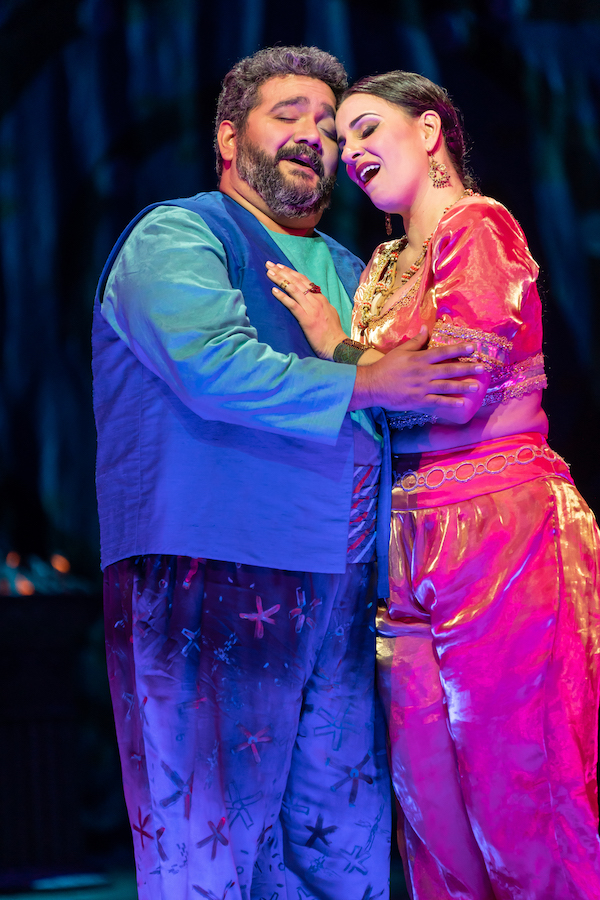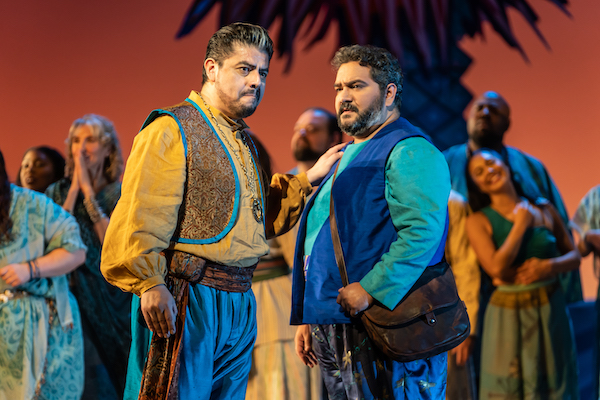A fine cast gleams in Bizet’s “Pearl Fishers” at Dallas Opera

Georges Bizet’s The Pearl Fishers, premiered in 1863, belonged to a new genre of opera that owed its genesis to the opening of Paris’ Théâtre Lyrique. The French tastes of opera lyrique, characterized by the expansiveness and clarity of melodic lines, vivid musical drama, and the role of the opera chorus in greater emphasis.
Despite a respectable run of 18 performances following the premiere, Parisian critics condemned the work, accusing Bizet of “Wagnerism,” describing the orchestration as noisy and overstuffed and decrying the robust bass role of the high priest Nourabad, with its imposing musical demands in grand-scale singing. Nevertheless, thanks to the enduring appeal of specific moments in the score—like the famous tenor-baritone duet “Au fond du temple saint”—the work found a resurrection in popularity and remains a pillar within the canon of opera repertoire.
The Dallas Opera’s opening performance of a short run of The Pearl Fishers, highlighted how grandiose singing and lyrical composition can create the sort of cognitive dissonance that informed many early critics’ condemnation of the work. However, the overall effect of the performance was defined by brilliant solo singing, which was enough satisfy at the Winspear Opera House Saturday night.
The Pearl Fishers tells the tale of a village of pearl divers on the ancient island of Ceylon. Nadir and Zurga, two old friends, have renounced love for the sake of their kinship, as they had once fallen in love with the same woman, Leila. When Leila is later ordained as a virgin priestess, Nadir’s love for her overwhelms his commitment to friendship, and she returns his affections despite the looming threat of death as a consequence of the virgin priestess betraying her vows. When the two lovers are found out by the village, high priest Nourabad leads the crusade demanding for their execution, but they are saved by Zurga, which ends in his own tragic demise.

The production from San Diego Opera, co-directed by Shawna Lucey and James Smith, presents the drama in an ambiguously exotic setting. Though the use of Orientalism was prevalent in Bizet’s day, this production, with stylishly abstract set and costume design by Zandra Rhodes, does well to eschew exotic visuals and instead focus on the opera’s more general themes—leadership, corruption, and the ethical practices in offices of faith and leadership.
Debuting at TDO in the role of Leila, soprano Joyce El-Khoury leans heavily on the lyrical demands of the score with supple elasticity. Her vocal prowess shone brightest in Leila’s cavatina of Act II. Here, she employs a gentle, laser-like lilt that rings clear and evenly from pianissimo to double forte. Her warm color, while lovely, belied the youth and innocence of the vestal virgin.
Yet El-Khoury was largely able to handle the virtuosity as well, though her flighty coloratura could have used more precision through the first act. The Act II duet with Nadir—their proclamation of love—felt unbalanced, though Bizet’s compositional language flouts traditional love duet expectation by forestalling the lovers’ coming together in harmony.
Opposite her in the role of Nadir, René Barbera was thoroughly captivating in his Act I aria. Here, he demonstrated an athletic sense of breath control and phrasing, unfurling sweet, melancholic lyricism with a light, agile touch. Conversely, he stood up firmly, vocally speaking, to Alfredo Daza’s booming baritone in the famed first act duet, rife with march-like, hymnal melody, which the two delivered with ravishing tone and a tight, consistent blend.
Daza, in the role of Zurga, had a robust, mature quality in tone that did well to convey the character’s depth of life experiences. He was particularly compelling in the final scenes of Act III, swinging with volatility from fiery rage to tender stoicism. Muscular and authoritative, his tone quality was consistent, even on the robust high A’s of his soliloquy.
Bass Morris Robinson is equal to the challenge of the “Wagnerian” demands of Bizet’s score. Known for his imposing, large voice, Robinson provided the role of Nourabad a heft that silenced others when the character spoke.
Under conductor Nicole Paiement, the orchestra supplied a supple sophistication in color and tone, with vibrant flute, harp, and oboe passages affectionately highlighted throughout.
The one debit in this performance was the lackluster choral singing. Alexander Rom’s preparation of the chorus could have benefited from better balances, though Paiment’s rapid tempos didn’t help, too often detached from the ensemble’s singing.
Eboni Adams’ choreography at times felt unnecessary and often distracting, however, she filled the stage with energy and tension during the more tumultuous crowd scenes.
The Pearl Fishers runs through April 10. dallasopera.org.
